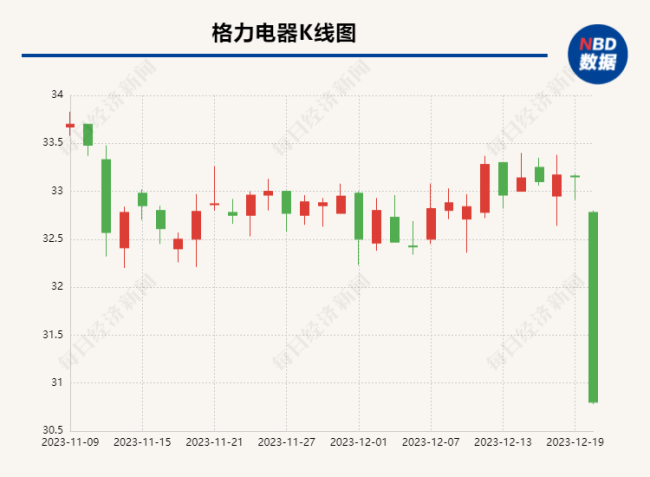Gree's Market Value Drops by 13.2 Billion in a Single Day, Stock Price Hits Annual Low
-
On the evening of December 19, Gree Electric Appliances (SZ000651, stock price 30.8 yuan, market value 173.4 billion yuan) announced late at night its intention to acquire 24.54% of Gree Titanium New Energy Co., Ltd. (hereinafter referred to as Gree Titanium) for 1.015 billion yuan. On December 20, Gree Electric's stock price plummeted upon market opening. By the close of trading on the 20th, Gree Electric's stock price had fallen by 7.09% in a single day, with a cumulative loss of over 13.2 billion yuan in market value.

Liu Buchen, a home appliance industry analyst, told reporters from Daily Economic News that whether Gree Titanium is a good asset has already been answered by investors. Mo Ke, founder and president of Zhen Lithium Research, stated in an interview that the advantages and disadvantages of lithium titanate batteries are very distinct. In certain niche markets, lithium titanate has its value. However, one should not expect lithium titanate to grow significantly, as it is indeed a niche market.
It is worth noting that Dong Mingzhu, Chairman of Gree Electric Appliances, has always been quite optimistic about Gree Titanium.
On June 30 this year, at Gree Electric's 2022 annual shareholders' meeting, Dong Mingzhu elaborated on the reasons for acquiring Gree Titanium and its current status. She stated that the company's technology itself is absolutely sound. "If the previous owner hadn't left me with a pitfall, this would be a very good company," she said. She mentioned that Gree Electric's photovoltaic storage air conditioning systems use Gree Titanium's batteries, and the safety of these batteries is particularly crucial for Gree's systems. If they hadn't acquired Gree Titanium at the time, Gree's photovoltaic storage air conditioning systems would not be feasible now.
However, financial data shows that in 2022, Gree Titanium's revenue was 2.587 billion yuan, with a net loss of 1.905 billion yuan.

Gree Electric's Stock Price Drops Over 7%
The National Business Daily noted that the price Gree Electric intends to pay for the Gree Titanium shares corresponds to a 100% equity valuation of 4.138 billion yuan for Gree Titanium.
In August 2021, Gree Electric acquired 30.47% of Gree Titanium's shares through public auction for 1.828 billion yuan. Based on that auction price, Gree Titanium's 100% equity was valued at nearly 6 billion yuan at the time. Going back further to August 2016, Gree Electric had planned to acquire 100% of Gree Titanium (then known as Zhuhai Yinlong New Energy Co., Ltd.) for 13 billion yuan, but the deal failed to pass Gree Electric's shareholder meeting.
It's evident that Gree Titanium's current overall valuation has declined significantly compared to 2016. Despite the lower acquisition cost now, investors have reacted negatively. On December 20, Gree Electric's stock price opened lower, with an intraday maximum drop of 7.15%. By the close, the stock had fallen 7.09% for the day, wiping out over 13.2 billion yuan in market value.
In fact, since Gree Electric took control of Gree Titanium in 2021, some investors have been skeptical about Gree Titanium's market prospects. The National Business Daily learned that at Gree Electric's 2022 annual shareholders' meeting in late June this year, many shareholders present expressed concerns about Gree Titanium's situation.
According to the latest financial data disclosed by Gree Electric, as of the end of June this year, Gree Titanium's total assets amounted to 24.311 billion yuan, with total liabilities of 24.245 billion yuan, leaving a net asset value of only 66 million yuan. In 2022, Gree Titanium's consolidated operating revenue was 2.587 billion yuan, a year-on-year increase of 27.69%; in the first half of this year, it achieved revenue of 1.44 billion yuan, up 23.31% year-on-year. However, in terms of net profit, Gree Titanium has yet to emerge from the quagmire of losses.
What is the financial outlook for Gree Titanium?
It is reported that Gree Titanium is a comprehensive new energy industry group integrating the research, production, and sales of lithium titanate battery core materials, batteries, intelligent energy storage systems, new energy vehicles, and the recycling and echelon utilization of power appliances. Currently, Gree Electric and Dong Mingzhu seem to be very confident about Gree Titanium's prospects.
In mid-June this year, at Gree Electric's 2022 annual performance briefing, the company's secretary of the board, Deng Xiaobo, stated that the company continues to focus on the green energy sector, currently concentrating on the layout of photovoltaic (storage) air conditioning, new energy vehicles, and lithium battery sectors. In the new energy vehicle sector, Gree Titanium's new energy vehicles are already operating in more than 230 cities across the country.
According to the "Gree Titanium New Energy" official account, Gree Titanium's patent for "A Lithium Titanate Composite Material and Its Preparation Method, Negative Electrode Sheet, and Lithium-Ion Battery" won the gold medal at the 23rd China Patent Award, making it the only lithium battery product patent in the new energy industry to receive this honor.
Liu Buchen, in an interview with reporters, stated that the reaction from the capital market indicates most investors do not believe Gree Titanium is worth increasing their holdings. Moreover, since Gree Titanium was included in Gree Electric Appliances' consolidated financial statements, it has not made a positive contribution to Gree Electric's net profit.
Mo Ke, speaking to a reporter from "Daily Economic News," noted that lithium titanate batteries still hold value in some niche markets. Their advantages are particularly evident: first, they have an exceptionally long cycle life, easily reaching 10,000 charge cycles; second, they perform well in high-power fast charging; and third, they offer high safety. However, their drawbacks are also significant. "The energy density of lithium titanate is low, currently only about half that of lithium iron phosphate batteries," Mo Ke said.
Additionally, when lithium titanate is used as a negative electrode material, its potential platform is as high as about 1.55V, meaning the entire voltage of a lithium titanate battery may be less than 2V. In contrast, graphite's voltage is 0V, allowing lithium iron phosphate batteries to achieve voltages of 3.2V–3.3V. The higher the voltage, the more electricity can be stored. "Using lithium titanate as a negative electrode material naturally reduces the battery's storage capacity, which is an inherent limitation," Mo Ke explained.
Lithium titanate has another characteristic: it's expensive. Few manufacturers produce it, making cost reduction difficult. However, lithium titanate batteries are well-suited for specific markets:
- Port cranes: These batteries provide high power, enabling instantaneous lifting of heavy cargo.
- High-altitude areas: They serve as an excellent choice for ensuring stable power supply in such locations.
"We can only find niche markets where its advantages align with applications that aren't cost-sensitive," Moke revealed to reporters. He also noted that commercial buses are increasingly abandoning lithium titanate batteries due to their persistently high prices.
According to the "2023-2027 Lithium Titanate Battery (LTO) Industry In-depth Market Research and Investment Strategy Report" released by the New Frontier Industry Research Center, China's lithium titanate battery market exceeded 550 million yuan in 2022.
On the afternoon of December 20th, reporters repeatedly called Gree Electric's secretary of the board office and securities department, but all lines were busy. Subsequent attempts to contact relevant Gree personnel for additional comments were met with the response: "Please refer to the official announcement."
